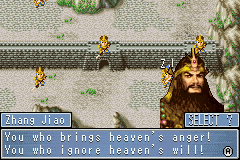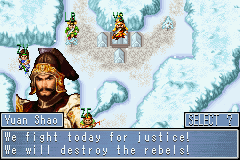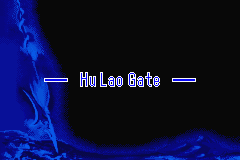Retro Replay Review
Gameplay
Dynasty Warriors Advance delivers a unique blend of turn-based strategy and fast-paced hack-and-slash action. At its core, the game presents a top-down board layout where each general moves their piece across a grid, seeking to engage enemy units or fulfill stage-specific objectives. Movement points are dictated by each character’s stats, requiring players to weigh the risks of advancing aggressively against the benefits of holding defensive positions.
(HEY YOU!! We hope you enjoy! We try not to run ads. So basically, this is a very expensive hobby running this site. Please consider joining us for updates, forums, and more. Network w/ us to make some cash or friends while retro gaming, and you can win some free retro games for posting. Okay, carry on 👍)
When two forces meet, the tactical board gives way to a streamlined combat arena. Here, the mechanics mirror those of the home console Dynasty Warriors titles in miniature: a single button for standard attacks, another for a powered strike, and a third to unleash a Misou (Musou) super attack when the meter is full. This simple control scheme ensures that even newcomers to the franchise can quickly grasp the core combat loop while still offering depth through timing, positioning, and special skill selection.
Between battles, the camp screen allows for gear management and skill upgrades. Players equip a primary weapon, secondary items, and select special moves that can turn the tide of encounters. Deciding which items to carry – from healing potions to stat-boosting accessories – introduces a light layer of resource management that keeps each mission feeling purposeful. These strategic choices complement the board-game layer, as certain weapons grant bonuses to movement or attack range, directly influencing how you approach the map.
Moreover, the difficulty curve is thoughtfully designed. Early skirmishes ease players into the dual strategy-and-action format, while later stages introduce more formidable enemy generals and complex objectives—such as escorting allied officers or capturing specific command posts under turn limits. This variety ensures that the core gameplay loop remains fresh throughout the campaign, encouraging multiple playthroughs with different characters and factions.
Graphics
On the Game Boy Advance hardware, Dynasty Warriors Advance boasts surprisingly detailed sprites and colorful environments. The board map is rendered with clear tile distinctions, making it easy to identify terrain types such as rivers, mountains, and plains at a glance. Unit icons—soldiers, siege engines, and generals—are all distinct, preventing confusion during crowded map scenarios.
When the action transitions to combat segments, the camera zooms in on your character in a modestly sized arena. Here, animations remain fluid for a handheld title: attack combos flow smoothly, and Misou attacks come with a brief but effective visual flourish. While you won’t see the sweeping camera pans or large-scale crowd effects of console entries, the GBA’s limitations are handled with polish. Background elements—trees, fort walls, and flags—help set the battlefield without overwhelming the screen.
The character portraits and cutscene art sprinkled throughout the briefing screens add personality and context to each general’s storyline. These still images feature expressive poses and vibrant colors, helping players differentiate between the three factions—Wei’s stern realism, Wu’s brighter tones, and Shu’s more heroic palette. The UI design is intuitively laid out, with clear icons for health bars, Misou gauges, and movement points, ensuring information is always accessible.
Overall, Dynasty Warriors Advance punches above its weight visually. It may lack the 3D grandeur of its console cousins, but it compensates with strong sprite work, cohesive art direction, and clear presentation—key elements for any strategy-driven handheld game.
Story
The narrative framework of Dynasty Warriors Advance faithfully adapts the Three Kingdoms period of Chinese history, a setting that has captivated gamers and historians alike. Each playable character—be it a general of Wei, Shu, or Wu—unfolds their personal arc against the backdrop of political intrigue and territorial ambitions. Although the GBA’s storytelling bandwidth is limited compared to later handhelds, the game weaves essential events from 190 A.D. onwards into concise mission objectives and dialogue snippets.
Missions are prefaced by briefing screens that outline both historical context and character motivations. These succinct summaries strike a balance between lore and gameplay, ensuring that even those unfamiliar with the Romance of the Three Kingdoms can follow the shifting alliances and betrayals. Key turning points—such as the Battle of Guandu or the founding of Shu by Liu Bei—are presented with enough drama to engage players without derailing the tactical focus.
Character interactions, though brief, highlight the personalities of legendary figures like Cao Cao, Sun Quan, and Zhuge Liang. Occasional animated portrait sequences during pivotal moments lend emotional weight, especially when allied officers fall or surprise reinforcements arrive. These touches elevate a standard strategy game into a more cinematic experience, even within the GBA’s modest storytelling capabilities.
The branching nature of the campaign—offering unique missions for each faction—encourages players to explore different political perspectives. Playing as a Wu commander yields very different challenges and dialogues than taking Shu’s side. This narrative replay value underlines the depth of the Three Kingdoms saga and keeps the story fresh across multiple campaigns.
Overall Experience
Dynasty Warriors Advance stands out as a creative reinterpretation of Koei’s flagship hack-and-slash franchise for the handheld market. By melding turn-based strategy with action combat, it offers a hybrid experience that is both intellectually engaging and satisfyingly visceral. The dual-layer gameplay ensures that players who enjoy planning as much as button-mashing will find plenty to love.
The campaign’s pacing and mission variety prevent monotony, and the three distinct character paths provide ample incentive for multiple playthroughs. Equipment management adds a strategic meta-game, making every decision—should I use my healing potion now or save it for a tougher gauntlet?—feel consequential. Even the most seasoned strategy fans will appreciate the tight integration of board and battle mechanics.
While the Game Boy Advance’s graphical and audio limitations are evident when compared to modern handhelds, Dynasty Warriors Advance makes the most of its platform. Crisp sprites, clear UI, and thematic music tracks combine to create an immersive atmosphere. The audio cues for charging Misou attacks and victory fanfare deliver the fan perks that series veterans expect.
For potential buyers, Dynasty Warriors Advance offers a robust package: a historically inspired storyline, adaptable difficulty, and varied gameplay modes. Whether you’re a longtime fan of the Three Kingdoms era or simply seeking a strategy game with genuine action flourish, this title remains a standout GBA offering worth revisiting.
 Retro Replay Retro Replay gaming reviews, news, emulation, geek stuff and more!
Retro Replay Retro Replay gaming reviews, news, emulation, geek stuff and more!









Reviews
There are no reviews yet.